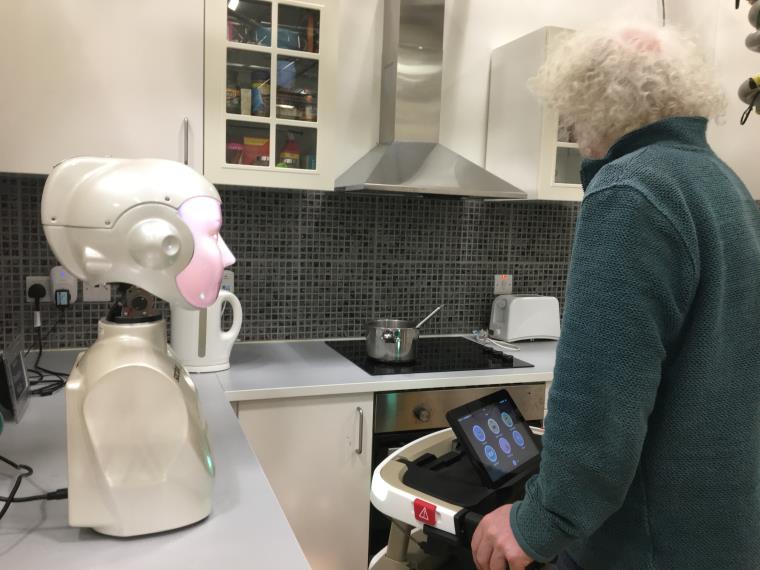Network launched to explore how robots can be used to support people living with frailty

A network of universities, led by UWE Bristol, has come together to explore how robots can be used to support people to better self-manage the conditions that result from frailty, providing information and data to healthcare practitioners, and enabling more timely interventions.
Professor Praminda Caleb-Solly, Professor of Assistive Robotics and Intelligent Health Technologies at UWE Bristol, is leading a team of four other UK universities, Sheffield, Heriot-Watt, Sheffield Hallam and Hertfordshire, who together have established a new network, EMERGENCE.
The aim of EMERGENCE is to create and catalyse robotics for the healthcare community, which connects researchers, health and social care professionals, service users, regulators and policymakers to influence the wider use of healthcare robots to support people living with frailty in the community.
Individuals with frailty have different needs but, commonly, assistance is needed in activities related to mobility, self-care, domestic life and social activities. Whilst providing cost-effective and high-quality support for an ageing population is a high-priority issue, the community's lack of adequate social care provisions and funding cuts have added to the pressures on an already overstretched healthcare system. In the face of a shrinking care workforce, the gaps in the ability to deliver the requisite quality of care have been particularly exposed during the ongoing Covid-19 crisis.
Professor Praminda Caleb-Solly said: “Healthcare robots are increasingly recognised as solutions in helping people improve independent living, by having the ability to offer physical assistance as well as supporting complex self-management and healthcare tasks when integrated with patient data.
“The EMERGENCE network will foster and facilitate innovative research and development of healthcare robotic solutions so that they can be realised as pragmatic and sustainable solutions providing personalised, affordable and inclusive health and social care in the community.”
The network will nurture and support a community of researchers in healthcare and robotics through pilot feasibility studies, sponsored and facilitated by the network to develop new approaches beyond the state-of-the-art. £300k will be made available in total for these pilot projects.
This project is supported through a three-year £700,000 EPSRC (The Engineering and Physical Sciences Research Council) NetworkPlus grant.
The EMERGENCE consortium is a world-class multi-disciplinary team who bring not only their expertise in healthcare technology research but also innovative living lab testbeds from across the country; the Assisted Living Studio at Bristol Robotics Lab covering the South West; the National Robotarium in Edinburgh; together with the Health Innovation South East Scotland’s Midlothian test bed; the Advanced Wellbeing Research Centre and CATCH HomeLab in Sheffield; and the Robot House at the University of Hertfordshire covering the South East.
Each testbed collaborates with its regional Academic Health Science Networks, care commissioning groups, Integrated Care Systems, hospital trusts, residential and community care providers, and local authority councils.
By bringing together their existing individual regional networks, EMERGENCE plan to create an exceptional and strong national network. The EMERGENCE consortium’s testbeds have already been enabling some of the key foundational research underpinning assistive robotics, including the Internet of Things and intelligent sensing, as part of user-centred, open innovation research projects.
Together they will bring the interdisciplinary skills and complementary approaches needed to spearhead a shared learning initiative to drive and coordinate the development of robotics technology for frailty in all health and social care sectors.
Professor Caleb-Solly added: “In achieving the network’s goal to galvanise patient-focused healthcare robotics research and knowledge exchange, we hope to increase uptake by facilitating interdisciplinary experts to come together in solving real-world challenges of supporting people with frailty, building a body of knowledge which can be extended to other patient groups.”
Related news

10 February 2026
Work by UWE Bristol lecturer features in Government’s National Cancer Plan
Work by a UWE Bristol academic has been included in the Government’s National Cancer Plan.

23 January 2026
On-demand minibus services beneficial in rural areas but face financial challenges, trials suggest
Trials of ‘demand responsive transport’ minibus services boosted connectivity for people in rural and suburban areas, according to a new report produced by UWE Bristol researchers.

18 December 2025
UWE Bristol professor appointed National Institute for Health and Care Excellence CEO
Jonathan Benger CBE, Professor of Emergency Care at UWE Bristol, has been appointed as the new chief executive officer of the National Institute for Health and Care Excellence (NICE).

17 December 2025
Findings revealed from first UK study into experiences of mothers who are survivors of rape pregnancy
UWE Bristol academics have revealed the findings of the first UK-based study of the experiences of mothers who are survivors of rape pregnancy.

11 December 2025
Social media influencer work is far more demanding than it looks, research finds
A study exploring the mental health impacts of social media influencer work has revealed that life online is far more demanding than it appears.

25 November 2025
UWE Bristol experts join film Q&A exploring music and melodrama
Academics will take part in the Cary Comes Home Festival, with a post-screening Q&A exploring music, melodrama and emotional storytelling in classic cinema.

17 November 2025
Urgent reform needed to support ambulance-delivered end of life care, study finds
More than three quarters (78 per cent) of paramedics sometimes fear doing the wrong thing when caring for people in the last year of life, new research has found.

13 November 2025
Bristol’s screen industry experiences “boom-and-bust cycle” after post-pandemic recovery, new research from UWE Bristol finds
New research from UWE Bristol provides detailed insight into Bristol's screen sector.

13 November 2025
New AI research to revolutionise animal welfare
A UWE Bristol research project will combine behavioural science and AI to create technology that understands not only what animals do, but how they feel.

10 November 2025
Lessons from Low Traffic Neighbourhoods will drive better public engagement, study finds
Lessons from Low Traffic Neighbourhoods have informed a new toolkit to improve engagement with the public on challenging local street issues.

06 November 2025
First-of-its-kind study aims to help more people spend their final days at home
A new study will explore how architectural design could support end-of-life care in domestic settings.

29 October 2025
UWE Bristol academic unveils breakthrough in energy-efficient AI at NATO science forum
Dr Jonathan Lancelot has developed a new form of AI that could transform how intelligent machines operate in space, defence, and remote environments.






